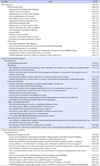Abstract
Purpose
The study was done to verify evidence-based practice (EBP) readiness and factors contributing to EBP competency in general hospital nurses.
Methods
Participants were 219 nurses working in 7 general hospitals in G-city and J Province. Data were collected from May 12 to May 28, 2015 and analyzed using one-way ANOVA, Pearson's correlation and stepwise multiple regression.
Results
Mean score for EBP competency was 3.89±0.83, for critical thinking disposition, 3.35±0.36, for EBP attitude, 3.53±0.66, for beliefs about value of EBP, 3.42±0.56, for ability in research performance, 2.86±0.57, for time to devote to EBP, 2.57±0.69 and for organization support for EBP, 3.36±0.46. EBP competency was significantly correlated with critical thinking disposition (r=.37, p<.001), beliefs about value of EBP (r=.43, p<.001), ability in research performance (r=.44, p<.001), and time to devote to EBP(r=.33, p<.001). Factors influencing EBP competency in general hospital nurses were research performance (β=.29, p<.001), beliefs about value of EBP (β=.24, p<.001), critical thinking disposition (β=.15, p=.014), recognition of EBP (β=-.18, p=.002), which together explained 35% of total variance.
Figures and Tables
Table 3
Evidence-based Practice Competency and Evidence-based Practice Readiness by General Characteristics (N=219)

References
1. Sackett DL, Straus SE, Richardson WS, Rosenberg W, Haynes RB. Evidence based medicine: How to practice and teach EBM. London: Churchill Livingstone;2001. p. 1.
2. Cho MS, Song MR, Cha SK. Nurses' perceptions regarding evidence-based practice facilitators in a tertiary hospital. J Korean Acad Fundam Nurs. 2011; 18(3):300–309.
3. Thiel L, Ghosh Y. Determining registered nurses' readiness for evidence-based practice. Worldviews Evid Based Nurs. 2008; 5(4):182–192. DOI: 10.1111/j.1741-6787.2008.00137.x.
4. Kim JS, Gu MO, Jo SY. Factors influencing evidence-based practice readiness for tertiary general hospital nurses. J Korea Acad Ind coop Soc. 2013; 14(6):2945–2957. DOI: 10.5762/KAIS.2013.14.6.2945.
5. Nagy S, Lumby J, McKinley S, Macfarlane C. Nurses' beliefs about the conditions that hinder or support evidence-based nursing. Int J Nurs Pract. 2001; 7:314–321. DOI: 10.1046/j.1440-172X.2001.00284.x.
6. Thorsteinsson HS, Sveinsdóttir H. Readiness for and predictors of evidence-based practice of acute-care nurses: A cross-sectional postal survey. Scand J Caring Sci. 2014; 28:572–581. DOI: 10.1111/scs.12083.
7. Ilic D. Teaching evidence-based practice: perspectives from the undergraduate and post-graduate viewpoint. Ann Acad Med Singapore. 2009; 38(6):559–563.
8. Squires JE, Estabrooks CA, Gustavsson P, Wallin L. Individual determinants of research utilization by nurses: A systematic review update. Implement Sci. 2011; 6:1. DOI: 10.1186/1748-5908-6-1.
9. Kim NY, Kim EA. Factors influencing of evidence-based practice competency in nursing students. J Korean Data Anal Soc. 2014; 16(5):2855–2868.
10. Kim YS, Kim JM, Park MM. Factors influencing competency in evidence-based practice among clinical nurses. J Korean Acad Nurs Adm. 2015; 21(2):143–153. DOI: 10.11111/jkana.2015.21.2.143.
11. Health Insurance Review & Assessment Service. [Internet]. Wonju: Health Insurance Review & Assessment Service;2016. cited 2016 September 22. Available from: http://www.hira.or.kr/rd/hosp/getHospList.do?pgmid=HIRAA030002000000.
12. Yi J, Park MH. Nurses' access & use of information resources and barriers & competency of evidence based practice. Korean J Adult Nurs. 2011; 23(3):255–266.
13. Ministry for Health and Welfare. (KR). Medical service act. 2016. 11. 30. Act No. 14183.
14. Upton D, Upton P. Development of an evidence-based practice questionnaire for nurses. J Adv Nurs. 2006; 53(4):454–458. DOI: 10.1111/j.1365-2648.2006.03739.x.
15. Melnyk BM, Fineout-Overholt E, Mays MZ. The evidence-based practice beliefs and implementation scales: Psychometric properties of two new instruments. Worldviews Evid Based Nurs. 2008; 5(4):208–216. DOI: 10.1111/j.1741-6787.2008.00126.x.
16. Lim KC, Park KO, Kwon JS, Jeong JS, Choe MA, Kim JH, et al. Registered nurses' knowledge, attitudes and practice about evidence-based practice at general hospitals in Korea. J Korean Clin Nurs Res. 2011; 17(3):375–387.
17. Kwon IS, Lee GE, Kim GD, Kim YH, Park KM, Park HS, et al. Development of a critical thinking disposition scale for nursing students. J Korean Acad Nurs. 2006; 36(6):950–958.
18. Lee HN, Byeon YS, Lim NY, Lee MS, Kim IS, Baek HJ. Nursing research. Seoul: Korean Nurses Association;2012. p. 30.
19. Son YJ, Kim SH, Park YS, Lee SK, Lee YM. The influence of information retrieval skill on evidence based practice competency in clinical nurses. Korean J Adult Nurs. 2012; 24(6):635–646. DOI: 10.7475/kjan.2012.24.6.635.
20. Brown CE, Wickline MA, Ecoff L, Glaser D. Nursing practice, knowledge, attitudes and perceived barriers to evidence-based practice at an academic medical center. J Adv Nurs. 2009; 65(2):371–381. DOI: 10.1111/j.1365-2648.2008.04878.x.
21. Melnyk BM, Findout-Overholt E, Stillwell SB, Williamson KM. Evidence-based practice: step by step: the seven steps of evidence-based practice. Am J Nurs. 2010; 110(1):51–53. DOI: 10.1097/01.NAJ.0000366056.06605.d2.
22. Profetto-McGrath J. Critical thinking and evidence-based practice. J Prof Nurs. 2005; 21(6):364–371. DOI: 10.1016/j.profnurs.2005.10.002.
23. Llasus L, Angosta AD, Clark M. Graduating baccalaureate students' evidence-based practice knowledge, readiness, and implementation. J Nurs Educ. 2014; 53:9 Suppl. S82–S89. DOI: 10.3928/01484834-20140806-05.
24. Solomons NM, Spross JA. Evidence-based practice barriers and facilitators from a continuous quality improvement perspective: An integrative review. J Nurs Manag. 2011; 19:109–120. DOI: 10.1111/j.1365-2834.2010.01144.x.
25. Hwang JI. Hospital nurses' uses of evidence, and barriers to and enablers of evidenced-based practice. J Korean Acad Nurs Adm. 2013; 19(2):292–303. DOI: 10.11111/jkana.2013.19.2.292.
26. Gu MO, Cho MS, Cho YA, Jeong JS, Jeong IS, Park JS, et al. Topics for evidence-based clinical nursing practice guidelines in Korea. J Korean Clin Nurs Res. 2011; 17(3):307–318.
27. Hospital Nurses Association. Evidence-based clinical nursing practice guideline [Internet]. Seoul: Hospital Nurses Association;cited 2016 April 20. Available from: http://www.khna.or.kr/web/information/guide.php.
28. White-Williams C, Patrician P, Fazeli P, Degges MA, Graham S, Andison M, et al. Use, knowledge, and attitudes toward evidence-based practice among nursing staff. J Contin Educ Nurs. 2013; 44(6):246–254. quiz 255-246. DOI: 10.3928/00220124-20130402-38.
29. Cho MS, Cho YA, Song MR, Kim MK, Cha SK. Development of a program to facilitate evidence-based practice based on the transtheoretical model. Korean J Adult Nurs. 2013; 25(2):136–147. DOI: 10.7475/kjan.2013.25.1.136.




 PDF
PDF ePub
ePub Citation
Citation Print
Print






 XML Download
XML Download